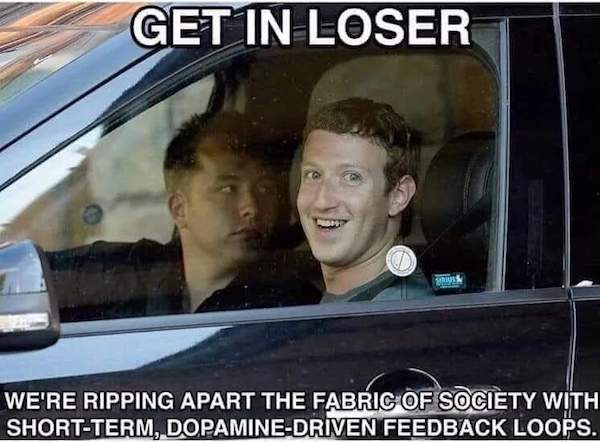It's a stickup
By Mark Hurst • August 6, 2020
The New York Times reported this week that Facebook Bets Big on Future of N.Y.C., and Offices, With New Lease. Facebook will swallow up all the office space in the James A. Farley Building, the giant post office building on 8th Avenue, topped by the famous inscription: "Neither snow nor rain nor heat nor gloom of night stays these couriers from the swift completion of their appointed rounds." Those words originally came from Herodotus, who knew a thing or two about empires.
The irony isn't lost on me that the two organizations, soon to be under the same roof, are on different trajectories. The Postal Service, a citizen-oriented communications system, is under increasing financial pressure. Facebook, a corporate monopoly with complicity in hate groups, election rigging, and outright genocide, is growing like a weed. And it's not just Facebook. As the NYT story reports, Apple, Amazon, and Google have also acquired large swaths of Manhattan real estate.
As I posted, what's striking, and a little depressing, about this news is that these four Big Tech companies represent practically the only economic vitality in New York City today. A third of New York's small businesses may already be gone forever (source: NYT). Yet our governor brayed that Facebook's takeover of the post office building "fortifies New York as an international center of innovation" - as though "innovation" equates to "building an unjust surveillance state." But at least he's consistent: not long ago this same governor publicly offered to change his name to Amazon Cuomo, if only Jeff Bezos would accept a servile offering of $3 billion from New York taxpayers, in order to open an office in the city. (Fortunately, citizen activists derailed the governor's bribe. Amazon has since opened office space in New York, no bribe necessary.)

The New York economy faces an unpleasant choice between (a) toxic tech monopolies or (b) nothing much, in the short term. I wonder how we move forward in cities, when we're facing such a binary option: hand everything over to Big Tech, or get abandoned to the wasteland that is the non-tech economy. Like so many other things these days, it's a one or a zero. At least that's how it's presented by Big Tech. What do you choose, fealty to the new lords? Or irrelevance and decline?
It reminds me of a famous bit by Jack Benny. A robber pulls out a gun and asks, "Your money or your life!" Benny, after a pause, responds: "I'm thinking it over!"
Big Tech is offering the same two options to all of us: hand over everything we value - the economy, media, education, finance, commerce, community, privacy, and democracy itself - or die.
It's a stickup.
Is it unfair of me to compare these companies to armed robbers? Last week we saw the Big Tech hearings, in which - as I described in some detail - the CEOs of these very companies shamed themselves with perjury, repetitively and near-continuously, for almost six hours. What do you call organizations led by people who so easily commit a federal crime?
• As I put it the next day: "Yesterday's hearings convinced me that the Big Tech companies are criminal operations."
• Then in the Washington Post this week, Zephyr Teachout wrote: "There are more than a few similarities between organized crime and these four companies."
• And then in the NYT, Tim Wu wrote that "it appears that without illegal maneuvers - without the anticompetitive buying of potential rivals - there might be no Big Tech."
• On my Techtonic show this week, I spoke with Lisa Macpherson, from Harvard and Public Knowledge, who wrote about fraud in the digital ad industry in an op-ed called The game is rigged. She used to be the CMO of Hallmark, and then CustomInk, but she left her career path after witnessing the fraud in Big Tech.
Nevertheless, crime does appear to pay quite well. Because of their "illegal maneuvers" with "similarities to organized crime," the day after the hearings these four Big Tech companies reported a quarterly profit of over $28 billion (source: Motherboard). Jeff Bezos personally became $7.6 billion richer in a single day (reports Marketwatch). Meantime the economy teeters as millions of American suffer from job loss, economic shock, a deadly pandemic, uncertain school plans, and for many, food insecurity, eviction, and homelessness.
But there is a glimmer of hope from Toronto. Citizens fought for two years and won against Google, which had planned to build a surveillance neighborhood on the waterfront there. I talked about this with urban-tech researcher Ben Green on the July 6 Techtonic (interview starts at the 10-minute mark). As Green writes in his book The Smart Enough City: Putting Technology in Its Place to Reclaim Our Urban Future, Toronto citizens formed #BlockSidewalk to stand up for their rights of privacy and data ownership. Google did its standard dance of denial, deflection, and deception (see the Big Tech hearings for more), until two years in, the situation was a full-blown PR crisis.
As I mentioned in the interview, I'm still waiting for New York City residents to take up the cause against Google's surveillance towers, aka LinkNYC, that blight the sidewalk in 2,000 locations around the city. These eyesores replaced payphones, many of which were unceremoniously dumped under the West Side Highway.
Someday, we'll find a much bigger landfill for thousands of Google surveillance kiosks. But first, we'll need to find a way to build an economy, and a society, free from companies that act more and more like organized crime.

Until next time,
- Mark Hurst
Subscribe to my email newsletter
Email: mark@creativegood.com
Twitter: @markhurst
Podcast/radio show: techtonic.fm
- - -